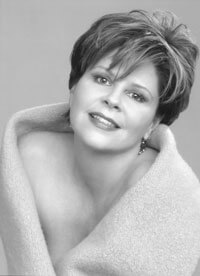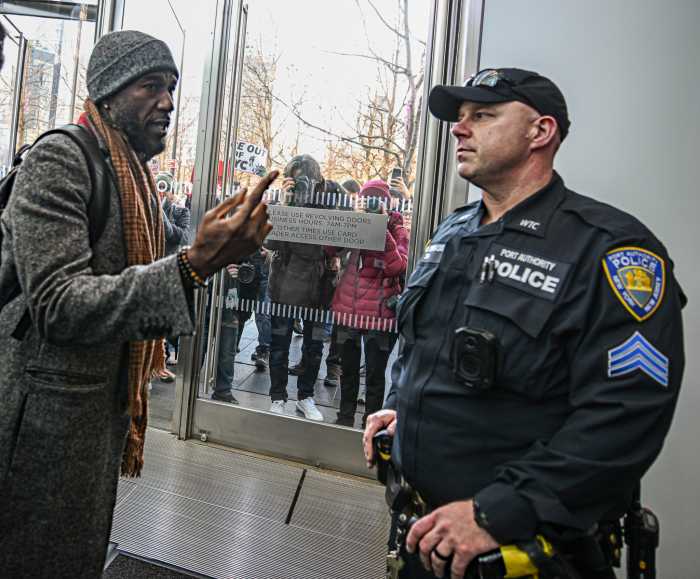Vivacious Susan Graham is ready for New York after a busy international tour
“Diva-schmiva!” the 43-year-old, Upper West Sider said with a laugh. “That word is so diluted now.”
She’s only too happy to trace diva back to its original roots: the leading lady of the opera. But that quick genealogy only finds her employing another term she’s willing to hit the mat for: prima donna.
“Right now, that’s someone who’s impossible to work or live with,” Graham explained. “Someone who has to have all the attention. In its original form, prima donna was something you would aspire to be because it’s the first lady of the opera. And the prima donna was always a diva. That was her God-given right.”
“Madonna,” is how Graham corrected the assumption that we won’t be seeing her on VH1 anytime soon.
“Madonna and Aretha,” she clarified before the question was even fully formed. “Those are the two divas on the pop scene––in my humble opinion, of course.”
And Graham’s opinion doesn’t become any less humble when it shifts from contemporary popular music to what she and others call contemporary opera’s “Golden Age of the Mezzo.”
Taken literally, a mezzo-soprano is nothing more than a half-soprano, sitting vocally between alto and soprano.
“I guess it takes two of us to make up a whole person,” Graham commented wryly, “but these days we’re not very rare at all. We’re a dime a dozen.”
Anyone lucky enough to score tickets to the Metropolitan Opera’s recent, sold-out production of Franz Lehar’s “The Merry Widow” might take exception to such a common categorization. After all, top tier ticket prices approached $300, but most would argue Graham was worth it. The role of Hanna Glawari—a rich young widow—was a virtuoso performance that had audiences doing something they rarely do at the opera: laughing. The New York Times called Graham’s characterization a cross between Lucille Ball and Carol Burnett. But Graham cautioned that as a singer who is being directed, “some of that isn’t really my call. I can’t bring Anna Nicole into ‘The Merry Widow’ if the director doesn’t want her there. And actually, I was sort of going for more of the Mary Tyler Moore mode. If I looked like Anna Nicole, I apologize.”
One thing Graham won’t apologize for is the recent resurgence of the lyric mezzo-soprano. Graham attributes the form’s cyclical resurgence to Marilyn Horne, whom she described as “kicking that door open and making a lot of repertoire known that we previously didn’t know existed. She was the queen of bel canto.”
Graham traced the current crop of mezzos in her own generation to Cecilia Bartoli, whom she described as “a wildly energetic and compelling little Italian girl with long curls who sang the spots of the page and coloratura in Rossini.” She attributes Bartoli’s rise to her “natural magnetism” and said, “She became a huge star immediately and that opened the door for people to realize that the prima donna can also be a mezzo. She brought a real useful glamour to mezzo-sopranos. Before she became such a big star, we were always the segunda donna. We were the Eve Arden to the Bette Davis.”
Deciphering the pecking order of mid-century actresses isn’t just a stray reference for Graham. She’s happy to hold forth on subjects as varied, yet specific as Terrence McNally, who wrote the part of Sister Helen Prejean that she premiered in Jake Heggie’s opera of “Dead Man Walking” to opera gossip “about being chased around tables” too hot to relay “for publication.” Of McNally during “Dead Man Walking” rehearsals, she recalled: “Music and opera are such a vital part of his life that he would take pictures of the whole process with his little Kodak Instamatic. He’d sit there with an elfin grin on his face. He was so happy to see this labor of love being brought to life before his very eyes. We all felt like we were part of something incredibly special and life-changing.”
Of being chased around tables, all she offered is the punchline, albeit in a thick European accent.
“My dear,” she clowned, “how unfaithful are you?”
Don’t even get her started on the director who guided her through Samuel Barber’s “Vanessa” with an “Anatol in head-to-toe motorcyclist leathers.”
Graham conceded that Bartoli’s ascent wasn’t as over night as it may now seem.
“She was 23 and selling millions of records,” Graham said, noting that women “kicked the three tenors off the headline” at least in terms of the television news glossy. The recent stories on news shows profiling Bartoli and Renee Fleming, who Graham just dueted with earlier this year at the Kennedy Center, suggest that Graham may be next in line to be run up the media flagpole and her Musical America Vocalist of the Year honor for 2004 suggests that this may be the year.
Graham, of course, was more circumspect, allowing that this type of limelight “goes hand-in-hand, but has nothing to do with singing. We’re fighting so hard to stay afloat as an entertainment option. Classical music, because of the lack of education and low priority that is placed on culture in our country, has experienced a kind of downturn in its popularity.”
Still, Graham is not throwing the baby out with the bath water.
“There is a certain element of opera that by its definition is larger than life and deserves some sort of grandeur.”
For example, when she debuted in the formidable role of Dido in Berlioz’s “Troyens” at Paris’ Theatre du Chatelet last year, it was not with Lucille Ball shtick, although, this morning she was unable to pass up screaming “Oh, Aeneas!” in Ms. Ball’s trademark “Oh, Ricky!” squeal.
After her comic outburst, Graham said of her Chatelet debut, “That was huge.”
“It was the Berlioz year,” she added, referring to the bicentenary celebration for Hector Berlioz, the former medical student, outsider, and ultimately, most outstanding romantic composer in French history. “And I’m a somewhat Berlioz singer. He wrote four operas and I’ve performed three of them and Dido is the pinnacle of female roles in opera. She’s an iconic character of mythical proportion.” Graham took a beat before adding, “Without getting into Wagner, of course.”
Graham probably hasn’t even tapped the well of roles she’d like to play. It’s a good time to be her.
“In the past few years, my repertoire has taken on a new direction to encompass a lot of these big, female parts,” she said. “As a lyric mezzo, we do a lot of pants parts. I play a lot of boys’ roles, but at certain point that loses its appeal for a maturing artist. I just got tired of crawling under furniture and jumping out windows.”
Graham, who was born in New Mexico, but spent her formative years in Midland, Texas, attributes the early identification of her talent to her adopted home state.
“In Texas, you don’t do anything halfway,” she laughed. “So I was thrown into all of these competitions. If you show any sort of talent at anything, parents, teachers, everyone basically, takes it on as their responsibility to help you develop it. It wound up being good for me although it was sort of torturous at the time. I just remember being 13 years old and panicking, but singing Maria in ‘The Sound of Music’ was a watershed moment for me.
“My grandfather came on a covered wagon and settled Eastern New Mexico,” Graham remembered. “I come from real tough-as-nails pioneer stock.”
But how does a “Don’t mess with Texas” attitude transfer to her current home on the Upper West Side?
“It’s what got me here,” Graham said. “I remember my first semester at school here being absolutely claustrophobic because you could only see a slice of the sky at a time. On my first trip back to Texas, I remember that between Manhattan and the Newark airport, there was not one-square-inch of undeveloped land: industrialized, turned into a dump or power plant, whatever. Where I come from, you can drive for 100 miles and not see another car, there are just prairies where you might see a cow or two. And they’ll be hungry cows because there’s nothing out there, but dirt and rocks.”
So how does Graham get her fix of dirt and rocks these days?
“I bought a house in Santa Fe,” she answered, beaming. “To get some of that big sky back in my life on a more regular, ownership-type basis.”
And between Manhattan and Santa Fe, Graham had to be reminded by her assistant that from now through May she’ll have been in 35 other cities.
One of the highlights of any tour is a stop at Carnegie Hall.
“I’m excited to see this new hall,” is how the seasoned professional jokes about her triumphant return to Carnegie, with a concert in the new Zankel Hall. Her good friend Bryn Terfel will be playing above her in the Isaac Stern Auditorium. The two have already joked about “trading places halfway through. We’ve been laughing about that all week. But I haven’t been in the new hall yet. I’ve sung in the other two so I’m eager to christen it.”



































